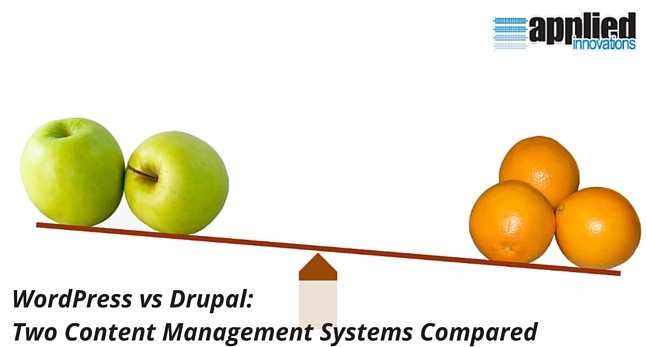
WordPress vs Drupal: Two Content Management Systems Compared
WordPress
Although Drupal was first created about three years ahead of WordPress, WordPress has about ten times more users. The reason for this is WordPress’s ease of use. Anyone, regardless of coding skills can learn this CMS. Simply follow the instructions and your first website can be created fairly quickly. Creating and publishing new posts and pages require writing your content in a simple editor followed by the click of a publish button. Of course, learning all of WordPress’s nuances will take time simply because there are so many of them. However, many of these aren’t required for getting a website up. You can learn them a bit at a time as they’re needed.
On the other hand, Drupal has a very steep learning curve which is the main reason its popularity pales compared to WordPress. WordPress is great for beginners and experienced people whose interest is the website content rather than the CMS’s flexibility and scalability. For many small and medium business owners concerned with getting their message and brand out there, what they have to say is more important than super long-term issues such as the CMS’s flexibility and scalability.
WordPress’s relative weaknesses compared to Drupal are its flexibility and scalability. The qualifier “relative” is important here because websites running on WordPress are quite varied in appearance, uses, and functionality. This kind of flexibility is achieved through the use of themes and plugins which are easily installed by anyone without coding experience.
Many themes have some built-in adjustability. However, if you can’t find the right “look” among the thousands of available themes, then you will have to find one that’s a close fit and then hire someone to make modifications. If what you want is radically different from what’s available, you will either have to get a custom-made theme or abandon WordPress.
WordPress’s functionality is flexible through the use of plugins. There are thousands of available plugins that do almost anything you can think of. If you want to convert your site to an ecommerce store, there’s a plugin for that. There are plugins for different forms, maps, sliders, and extra editing tools.
There is a price for this flexibility: plugins add extra code to your website which slows down its performance. While using a caching plugin helps with performance issues, every plugin you use is a potential security risk because hackers love to exploit vulnerabilities in popular plugins. When one hacker discovers a vulnerability, the information is spread to the rest of the hacker community. The WordPress community works hard to ensure that CMS vulnerabilities are patched. However, this won’t help you if one of your plugins has a security hole. Free plugins often have vulnerabilities that never get patched.
Finally, WordPress works well with small to medium-sized websites. It does not perform as well as Drupal for very large sites. You will need a good-sized server to host mega-sized WordPress sites.
Drupal
Drupal’s steep learning curve weeds out most people except developers. There are plenty of developers that use WordPress and make a good living from it. They target people and businesses that don’t require the features that make Drupal unique. What are these features? As mentioned previously, some businesses want to scale their sites to massive sizes and Drupal handles this without a hiccup. If you want a site with thousands of pages with huge traffic volumes, Drupal is for you. The Drupal CMS by itself without the aid of plugins is immensely flexible with the types of pages you can create. Not using plugins removes the plugin security vulnerabilities associated with WordPress.
Drupal is perfect for enterprise sized websites for the largest companies. This scalability and security advantage is the reason it is the CMS of choice for government websites around the world.Whitehouse.gov uses Drupal partly because of its enterprise level security.
Drupal is more than a mere content management system however. It is a content management framework. This means you can develop a content management system of your very own. This is the ultimate in flexibility. If the WordPress CMS lacks features that you want, then make your own CMS with Drupal. Creating a CMS this way is far more efficient than coding it from the ground up.
If you are a developer who has mastered Drupal, you can efficiently create any solution you like. This flexibility does come at a price. Development will take longer than setting up a WordPress site. However, the Drupal developer can target high paying corporate clients who will not tolerate approximate solutions. They know exactly what they want and know that approximate solutions will reduce their profits. They will pay more money and tolerate longer development times for this. The experienced Drupal developer who can market himself well, can land $40k contracts with large companies.
For questions about web hosting and how we can help your business, please contact us.
Photo Source / Desaturated from original
